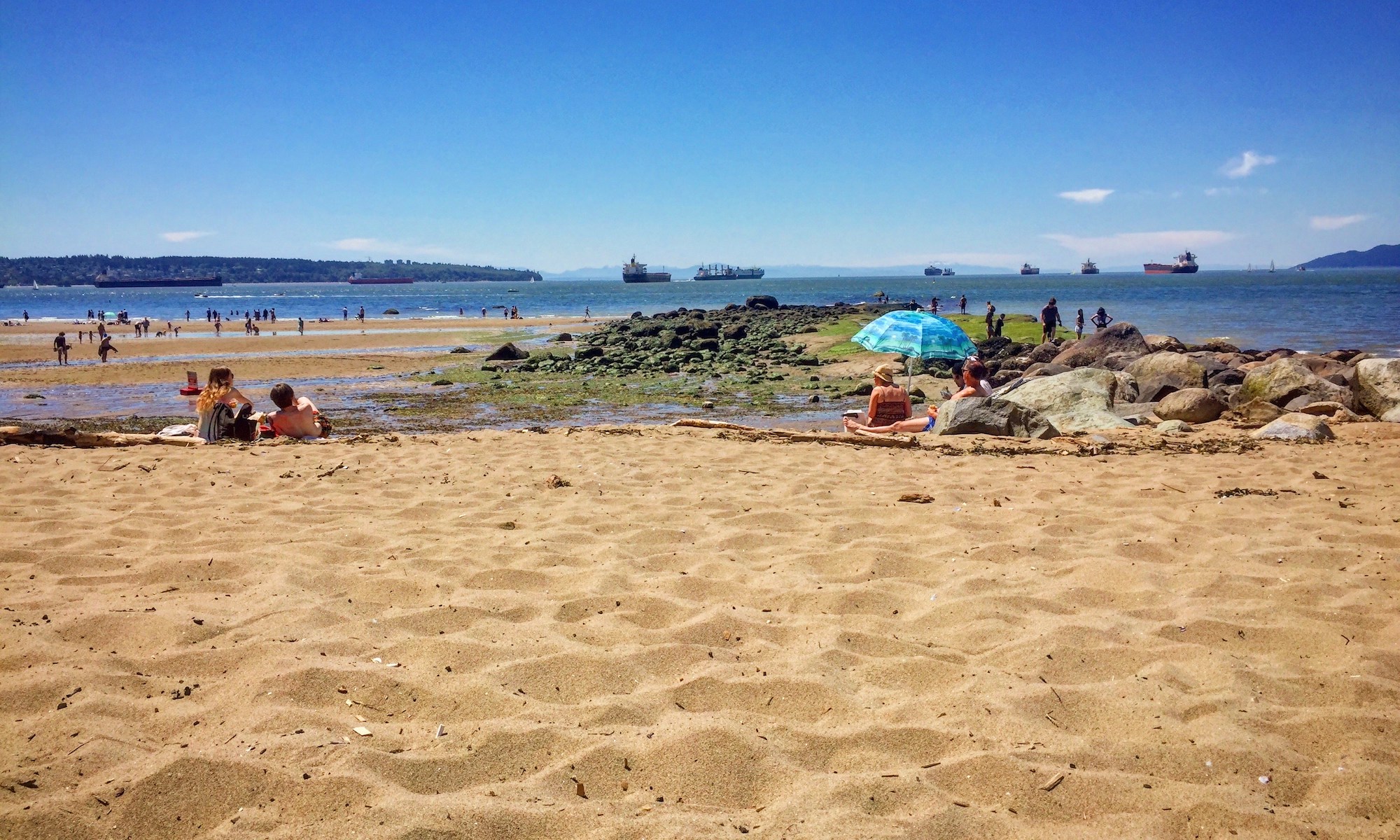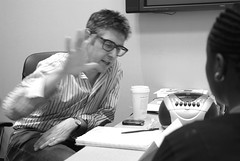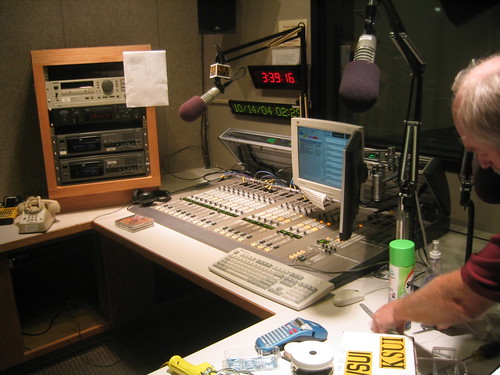Even though I am an avid fan of podcasting, I do love internet radio. You can only listen to so many podcasts and your own music library so much, so when I need it, it’s there. However, it’s under threat. Get more of the story at Savenetradio.org or the Radio and Internet Newsletter (RAIN), but I’ll also give a bit of personal back story to my interests in this issue.
In April of 2002, I was the Production and Community Affairs Director at KRUI. A little, 100watt college radio station that I spent nearly six years toiling with, and I became the Operations Director(station engineer) that following month. Just a short time before that, we established the first webcast in the history of the radio station, and it has continued to this day. In fact, I still tune in to hear DJ’s mumble about the music that gets played and hear my voice on the numerous station ID’s that I created while I was there. (By the way, check out my portfolio to hear some of that stuff. Did some updating to that as my job hunt in Vancouver has swung into full gear.)
The DMCA[wiki] set into motion a string of debates as to the copyright royalties that music labels should get from internet radio stations. In 2002, those rates were astronomical, so much that the fees were going to force a huge percentage of streams to turn off, including ours. Basically, the costs calculated out to having internet radio stations to pay a certain amount of money per song, per listener. That means you would have to track not only what songs you played but as to how many people heard it as the time it was played. Combine that cost with the resources it would take to track all that information and the numbers shoot up quick.
These costs were going to be retroactive to a specified time, and if you were webcasting for a few years, then you would have been in severe debt when these rates took hold. For some, that mean six figures in fees. Major ouch, especially for a tiny station like KRUI which, at that time, ran on a yearly budget of nearly $16,000.
Being good little college students that we were, we protested this. We weren’t the only ones. Numerous internet radio stations participated in the “Internet Radio Day of Silence”[rain] where streamers either turned their streams off completely or restreamed a marathon program from Wolf FM, which is what we did.
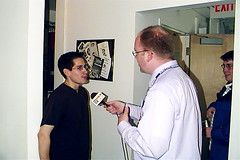 We even worked our connections with the local newspapers and TV stations to spread the word about the issue and our participation in the day of silence. I even showed up on the six o’clock news in my sleep deprived stupor from getting all the equipment in place the night before. I actually wrote papers and did speeches about this topic in some of my college courses because I knew the ins and outs of it so well. In fact, I traveled to the CMJ conference in New York that fall and attended a panel discussion about this. Kurt Hanson from RAIN shared the table with other major players and was a pleasure to meet as well.
We even worked our connections with the local newspapers and TV stations to spread the word about the issue and our participation in the day of silence. I even showed up on the six o’clock news in my sleep deprived stupor from getting all the equipment in place the night before. I actually wrote papers and did speeches about this topic in some of my college courses because I knew the ins and outs of it so well. In fact, I traveled to the CMJ conference in New York that fall and attended a panel discussion about this. Kurt Hanson from RAIN shared the table with other major players and was a pleasure to meet as well.
Additionally, this latest threat is prompting another “Day of Silence” for internet radio stations. Find out more here.
In the end, the powers that be lost out, internet radio took a sigh of relief, and the royalty rate structure went back to the drawing board. The group in charge of collecting these fees, SoundExchange (which is comprised of a board with heavy influence of the RIAA), are about to unleash an updated royalty rate that is going to choke a lot of streaming stations on the day it takes effect.
By now you’ve likely heard the news about the Copyright Board’s ruling regarding net radio. Simply put, it approximately triples the amount paid to record labels via SoundExchange for streaming Internet radio over the next three years, changes the way the payments are computed (from what is called an “Aggregate Tuning Hour” basis to a straight “per play”), adds a confusing and onerous “per station minimum” fee with no maximum, and extends the new rates back to the beginning of 2006. Many small Webcasters won’t be able to afford this, and you can bet large Webcasters like us are all taking a hard look at the Internet radio business and our products to decide if it’s really worth the cost. Big companies might have more money, but they can’t stay in businesses where they don’t make any profit, a pretty simple business fact.
Compare the implications of this decision to terrestrial radio which pays NOTHING to SoundExchange, or even satellite radio which pays only 3-7% of their revenue to SoundExchange, and it’s hard not to be left scratching your head. The irony of all this, of course, is that this ruling will keep LAUNCHcast, Pandora, and the like out of your living room and push you toward FM, where the labels are paid zero. This decision cuts off a genuine future revenue stream before it has had a chance to grow. [savenetradio]
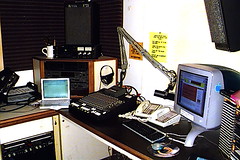 As some one who fought for this before, I can say that there is no dispute that recording artists shouldn’t be credited and payed for the music that they create. However, rates like this that makes the entire medium suffer and puts functionality into the hands of a minority of players that can afford rates like this is appalling. I encourage you to go to Savenetradio.org and find ways to help fight these rates.
As some one who fought for this before, I can say that there is no dispute that recording artists shouldn’t be credited and payed for the music that they create. However, rates like this that makes the entire medium suffer and puts functionality into the hands of a minority of players that can afford rates like this is appalling. I encourage you to go to Savenetradio.org and find ways to help fight these rates.
Food for thought, if you are an RIAA member or are big enough to strike a deal with them, you wouldn’t have to pay these rates because you would already own the rights to stream the music. There are only a few entities that can afford to make compromises like that, thus killing off those who do internet radio for the soul purpose of doing it for the purpose of making enough revenue to cover costs. Being retroactive, it’s not as easy as going with music that falls outside of these fees starting right now. Amazing how all the bases seemed covered to limit the effectiveness of internet radio as a whole and putting it into the hands of those that have the budget for it.
For a little radio station like KRUI, having a webcast is vital. Students that go to school there can move away and still tune into their beloved college station. It’s also an amazing way to garner more listeners who have no radio access but can still tune in from the computer lab. Plus, mom and dad can listen in, and my parents did a fair share of that during my time there. I can’t forget to mention that WOXY doesn’t need another reason to shut down again. Geez.
Update: Getting caught up on my RSS feeds, I found this article on BoingBoing that has Rusty Hodge from SomaFM speaking about this topic.
Also, Adam Curry interviewed Doc Searls about this topic on Daily Source Code #587. It’s a little over the halfway point in the episode that the conversation starts. Good background to a very complicated story.
